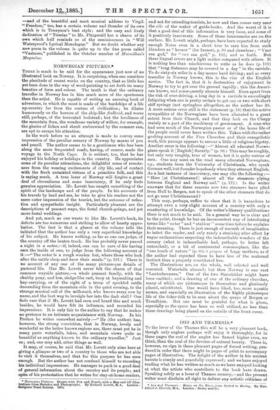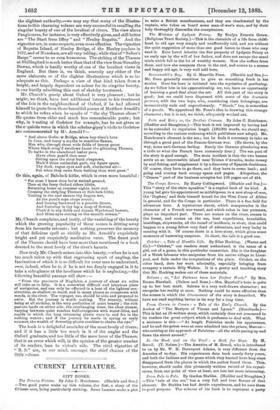ISIS AND THAMESIS.* To the lover of the Thames this
will be a very pleasant book, though only anglers perhaps will enjoy it thoroughly, for in these pages the zeal of the angler has flamed higher even, we think, than the zeal of the devotee of natural beauty. There is, however, no sign in these pleasant pages of forced writing, pro- duced in order that there might be pages of print to accompany pages of illustration. The delight of the author in his ancient haunts is simply and gracefully expressed ; and we have enjoyed reading what he has written as much as we have enjoyed looking at what the artists who contribute to the book have drawn. Speaking solely as a lover of Thames scenery,—and the present writer must disclaim all right to deliver any artistic criticism of
• Isis and Thamesis : Hours on the River, from Orford to Melvin. By Rev. Alfred J. Church, H.A. London : Seeley and Co.
the slightest authority,—we may say that many of the illustra- tions to this charming volume are very successful in recalling the singular beauty of one of the loveliest of rivers. The view above Pangbonrne, for instance, is very effectively given, and still better
are " The Start from Utley " and " Henley Regatta." And the vignettes are, in some respects, even more effective. The vignettes of Regatta Island, of Henley Bridge, of the Henley poplars in 1872, and of Nuneham, are all very telling; while that of " Salter's Barge" seems to us even humorous. The etching of the Thames at Shillingford is much better than that of the view from Streatley Downs, which is hardly worthy of one of the loveliest views in England. But there is, we think, scarcely any either of the more elaborate or of the slighter illustrations which is so in- adequate as this. Perhaps a view of that kind taken from a height, and largely dependent on colour for its singular beauty, is one hardly admitting this sort of sketchy treatment.
Mr. Church's gossip about Oxford is very pleasant ; but he might, we think, have lent additional interest to his treatment of the Isis in the neighbourhood of Oxford, if he had allowed himself to quote from those beautiful poems of Matthew Arnold's to which he refers when be speaks of " the shy Thames shore." He quotes from older and much less rememberable poets ; but why, in treating of Godstow for example, has he not given us
the exquisite verse in which the scholar-gipsy's visits to Godstow are commemorated by M•. Arnold?— "And above Godst( w Bridge, when hay-time's here
In June, and many a scythe in sunshine flames, Men who, through those wide fields of breezy grass Where blaok.wing'd swallows haunt the glittering Thames, To bathe in the abandoned lasher pass, Have often peered thee near Sitting upon the river bank o'ergrown, Mark'd thine outlandish garb, tby figure spare,
Thy dark, vague eyes and soft, abstracted air—
But when they came from bathing thou wert gone."
Or this, again, of Bab-lock-hithe, which is even more beautiful :
" For most I know thou lov'et retired ground, Thee at the ferry Oxford riders blithe, Returning home on summer nights, have met Crossing the stripling Thames at Bab-lock-hithe, Trailing in the cool stream tby fingers wet, As the punt's rope chops round ; And leaning backward in a pensive dream, And fostering in thy lap a heap of flowers, Pluok'd in shy fields and distant Wychwood bowers, And thine eyes resting on the moonlit stream."
Mr. Church complains, and justly, of the vanishing of the beauty which the growing popularity of these scenes is driving away from his favourite retreats ; but nothing preserves the memory of that delicious spell so vividly as Mr. Arnold's exquisitely bright and yet exquisitely meditative verse. The finest poet of the Thames should have been more than mentioned in a book devoted to the most lovely of the river's haunts.
How truly Mr. Church enters into this beauty,—when he is not too much taken up with that engrossing sport of angling, the fascination of which it is so difficult for some men to understand, —or, indeed, when he is, if he is not too deeply engaged in it to take a side-glance at the loveliness which he is neglecting,—the following beautiful passage will show :—
" From the precincts of Magdalen, a journey of about SIX miles will take us to Islip. It is a somewhat difficult and laborious piece of navigation, and can only be effected in a boat of the lightest con- struction, so shallow, so rapid, and in many places so overgrown with weeds, is the river. The voyager, too, should be able and prepared to swim. But the journey is worth making. The scenery, without being at all striking, is the very perfection of quiet beauty ; the rich pasture lands on either side, the overhanging trees, the clear stream, varying between quiet reaches half-overgrown with water-lilies, and rapids in which the long streaming plants ware to and fro in the rushing waters ; and if the journey be made in spring or early summer, the wealth of flowering-plants combine to charm the eye."
The book is a delightful reminder of the most lovely of rivers; and if it has a little too much in it of the angler and the Oxford graduate, and too little of the mere lover of the Thames, that is an error which will, in the opinion of the greater number of its readers, lean to virtue's side. The vivid vignettes of " R. S." are, to our mind, amongst the chief charms of the little volume.



















































 Previous page
Previous page